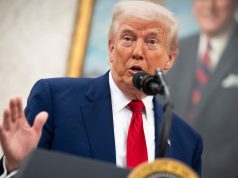
What is a ‘Kavanaugh stop’?
The name derives from a September ruling by the Supreme Court, which by a 6-3 vote lifted a lower-court order barring immigration agents in Los Angeles from stopping people based solely on several factors, including race. The original case was brought by plaintiffs who argued agents conducting immigration sweeps targeted L.A. residents just for being working-class Latinos. Such profiling has been barred since 1975, when the Supreme Court unanimously ruled that California border agents who stopped a car because its occupants looked Mexican violated the Constitution’s protections against unreasonable searches and seizures. In the L.A. case, a federal judge ruled that agents needed more than a combination of a person’s race or ethnicity, the fact that they spoke Spanish or accented English, the type of work they do, and where they were found to justify detaining someone. The Supreme Court’s conservative majority reversed the ruling—opening the door, liberal Justice Sonia Sotomayor wrote in a dissent, to “a country where the government can seize anyone who looks Latino, speaks Spanish, and appears to work a low-wage job.” The majority issued no explanation for its decision, but Justice Brett Kavanaugh laid out his reasoning in a concurring opinion.
What did Kavanaugh say?
He said it was constitutionally permissible—and indeed “common sense”—to target people due to “apparent ethnicity” combined with other factors, such as speaking Spanish or being at a car wash or bus stop. Being stopped on such grounds is a minor inconvenience, wrote Kavanaugh; any questioning is “typically brief” and U.S. citizens and legal residents will “promptly go free.” Immigration lawyers and rights groups reacted with alarm to the ruling. The court “greenlit racial profiling,” said Jennifer Bade, an immigration attorney in Boston. “This effectively makes us a ‘show your papers’ nation where appearance and language is going to make everyone a suspect.”
Has racial profiling increased?
Residents of Chicago and other areas where the Trump administration has launched an immigration crackdown say roving patrols of federal agents are increasingly stopping anyone who looks Latino and demanding ID. In numerous cases, U.S. citizens have been handcuffed, questioned, and held for hours or even days before agents confirmed their status. “We have never seen this type of enforcement on the streets ever,” said Mark Fleming, an attorney at the National Immigrant Justice Center. Maria Greeley, 44, a Chicago restaurant worker, said she was zip-tied by three federal agents on her way home from work. She showed her passport but was questioned for an hour by the agents, who insisted she didn’t “look like” a Greeley and called her a liar. It was “terrifying,” she said. “I am Latina and I am a service worker. I fit the description of what they’re looking for now.”
How many citizens have been detained?
There’s no official number, but news organization ProPublica has documented more than 170 cases this year where federal agents held citizens against their will. Some were tackled, beaten, and tased; about two dozen said they were held for more than a day with no chance to call a lawyer or family member. At least three were pregnant, and nearly 20 were children. In many cases, administration officials claimed the detainee had assaulted or impeded agents, but charges were often not filed or cases were dismissed. It happened to Javier Ramirez, 32, an auto shop owner in Montebello, Calif. He says agents entered his business, wrestled him to the ground, held him at gunpoint, and took him to a detention center where he spent five days before being released. Homeland Security said he assaulted officers; security footage shows no assault and charges against him were later dropped.
How are Latino communities responding?
Raids are creating a “culture of fear” that’s causing even citizens to stay home for fear of being detained, said Mario Trujillo, a councilman in Downey, Calif., a heavily Latino L.A. suburb. Many citizens in targeted areas now carry passports everywhere they go, including members of other minorities. “Now the onus is on anyone who’s not white, male, and MAGA to prove they belong in this country,” said Paul Liu, a Chinese American in Fresno, Calif. Homeland Security spokeswoman Tricia McLaughlin insists that ICE operations are “highly targeted” and calls allegations of racial profiling “categorically false.” But top Border Patrol commander Gregory Bovino has admitted his agents consider appearance when arresting someone. One factor, he told a white reporter, is “How do they look compared to, say, you?”
Do citizens have recourse against such arrests?
The question of whether agents can legally use race as the basis for a stop isn’t fully settled. The Supreme Court ruling was issued through its emergency “shadow docket,” and lawsuits from plaintiffs who claim their civil rights were violated by racial profiling are working their way through the judicial system and could eventually be heard by the high court. One suit was filed by Leo Garcia Venegas, 26, a U.S.-born citizen who was detained twice by federal agents while working at construction sites in Alabama; in one instance, he was wrestled to the ground, told his REAL ID was fake, and held for over an hour before being released. He said the agents did not question any white or Black workers. It’s possible such a case may produce a different outcome at the Supreme Court, but given the earlier ruling and the deference the conservative majority has shown to the administration, it’s not considered likely. In the meantime, the indiscriminate stops are having what activists believe is the desired effect: spreading fear. “I cannot work in peace anymore,” said Garcia Venegas. “I am always nervous.” What is a ‘Kavanaugh stop’? The name derives from a September ruling by the Supreme Court, which by a 6-3 vote lifted a lower-court order barring immigration agents in Los Angeles from stopping people based solely on several factors, including race. The original case was brought by plaintiffs who argued agents conducting immigration sweeps targeted L.A. residents just for being working-class Latinos.
Activists say a Supreme Court ruling has given federal agents a green light to racially profile Latinos





